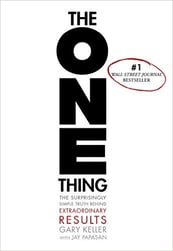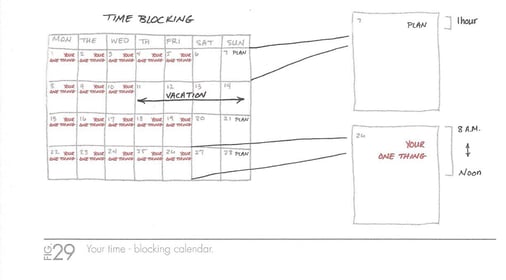Last week I took a mini vacation to golf and spend time with a best friend in Phoenix/Tucson. It prevented me from writing my next blog on Confessions of the Pricing Man: How Price Affects Everything by Hermann Simon, although it did provide me with considerable time to read and make notes on pricing.
 For that reason, I will continue to share ideas on pricing in my next blog, and thought it would be a good time to repeat this blog on the importance of time blocking your vacations first.
For that reason, I will continue to share ideas on pricing in my next blog, and thought it would be a good time to repeat this blog on the importance of time blocking your vacations first.
In Gary Keller’s book, The One Thing: The Surprisingly Simple Truth Behind Extraordinary Results, Keller shares one question:
What’s the ONE Thing I can do such that by doing it everything else will be easier or unnecessary?
He urges his readers to practice Time Blocking, to dedicate 4 hours a day to their One Thing.
 Surprisingly he recommends making the first time block you schedule your vacations!
Surprisingly he recommends making the first time block you schedule your vacations!
It may seem odd to do this first. Keller’s reasoning; when you intend to be successful, you start by protecting time to recharge and reward yourself. Take time off. Block out long weekends and long vacations, and then take them. You’ll be more rested, more relaxed and more productive afterward. Everything needs rest to function better, and you’re no different. Resting is as important as working.
Here again is Why Your First Time Block is Vacation – Your One Thing from February 4th of this year:
In The ONE Thing: The Surprisingly Simple Truth Behind Extraordinary Results by Gary Keller, Jay Papasan, Gary Keller shares the following story to emphasize the power of Time Blocking:
In July 2007, software developer Brad Isaac shared a productivity secret he reportedly got from comedian Jerry Seinfeld. Before Seinfeld was a household name and still regularly toured, Isaac ran into him at an open-mic comedy club and asked him for advice on how to be a better comedian. Seinfeld told him the key was to write jokes (hint: his ONE Thing!) every day. And the way he’d figured out how to make that happen was to hang a huge annual calendar on the wall and then put a big red X across every day he worked on his craft. “After a few days, you’ll have a chain,” Seinfeld said. “Just keep at it and the chain will grow longer every day. You’ll like seeing the chain, especially when you get a few weeks under your belt. Your only job is to not break the chain. Don’t break the chain.”
Walter Elliot said, “Perseverance is not a long race; it is many short races one after another.” Keller notes the key is as you complete these short races and get a chain going, it gets easier and easier. Momentum and motivation start to take over.
Still not convinced Time Blocks work? Keller provides this example:
In On Writing, Stephen King describes his work flow: “My own schedule is pretty clear-cut. Mornings belong to whatever is new—the current composition. Afternoons are for naps and letters. Evenings are for reading, family, Red Sox games on TV, and any revisions that just cannot wait. Basically, mornings are my prime writing time.”
When Keller tells this story, one person always says to me, “Well, sure, it’s easy for Stephen King—he’s Stephen King!” Keller simply replies, “I think the question you must ask yourself is this: Does he get to do this because he is Stephen King, or is he Stephen King because he does this?”
Invariably Keller notes, that stops the discussion cold.
There is magic in knocking down your most important domino day after day.
Sound simple? Time blocking is—if you protect it.
 Here are Keller’s keys to achieving extraordinary results and experience greatness: time block these three things in the following order:
Here are Keller’s keys to achieving extraordinary results and experience greatness: time block these three things in the following order:
- TIME BLOCK YOUR TIME OFF: It may seem odd to do this first. Keller’s reasoning; when you intend to be successful, you start by protecting time to recharge and reward yourself. Take time off. Block out long weekends and long vacations, and then take them. You’ll be more rested, more relaxed and more productive afterward. Everything needs rest to function better, and you’re no different. Resting is as important as working. This agrees with a recommended book I often suggest to my customers and friends, The Power of Full Engagement. Energy, not time, is the new currency for productivity. We visited these ideas several times in this blog including: Key Behaviors Build Effective Energy Management Rituals, Why You Need Positive Energy Rituals, and Vacations - Breakthrough in Time Management. Have you scheduled your vacation time for this year? After reading this, I intend to have my vacations planned for the year by the end of the first quarter. What is your priority in order to accomplish this?
- TIME BLOCK YOUR ONE THING: After you’ve time blocked your time off, time block your ONE Thing. Yes, you are reading this right. Keller recommends your most important work comes second. Why? Because you can’t happily sustain success in your professional life if you neglect your personal “re-creation” time. Time block your time off and then make time for your ONE Thing. The most productive people, the ones who experience extraordinary results, design their days around doing their ONE Thing. Their most important appointment each day is with themselves, and they never miss it. If they complete their ONE Thing before their time block is done, they don’t necessarily call it a day. They use the Focusing Question to tell them how they can use the time they have left. (Today, what’s the ONE Thing I can do for my ONE Thing such that by doing it everything else will be easier or unnecessary?”) Similarly, if they have a specific goal for their ONE Thing, they finish it, regardless of the time. In A Geography of Time, Robert Levine points out that most people work on “clock” time—“It’s five o’clock, I’ll see you tomorrow”— while others work on “event” time— “My work is done when it’s done.” My father had a farm, and most of my cousins lived on dairy farms which makes Keller’s next thought easy for me to relate to. Think about it. The dairy farmer doesn’t get to knock off at any certain time; he goes home when the cows have been milked. It’s the same for any position in any profession where results matter. The most productive people work on event time. They don’t quit until their ONE Thing is done.
The key to making this work is to block time as early in your day as you possibly can. Give yourself 30 minutes to an hour to take care of morning priorities, then move to your ONE Thing. Based on factors of willpower (Willpower Rules Your Performance), my recommendation is to start with your One Thing first. If you do the other things, first you’re reducing your will power and diminishing your capacity to achieve your One Thing
Keller’s recommendation is to block four hours a day. This isn’t a typo. He repeats it: four hours a day. Honestly, that’s the minimum. If you can do more, then do it.
Imagine your life depended upon it! In 2012, when I was in the hospital with AML for 8 months, my life truly depended upon me doing something different. Part of my prescription for getting better included meditation. On a regular basis I meditated 2 hours or more a day. I still meditate an hour or more each day. I don’t believe I would still be here without it.
What would you do if your life depended upon it? I’ll bet you’d find 4 hours minimum a day if you felt it would save you or the life of a loved one!
“Efficiency is doing the thing right. Effectiveness is doing the right thing.” —Peter Drucker
- TIME BLOCK YOUR PLANNING TIME: The last priority you time block is planning time. This is when you reflect on where you are and where you want to go. For annual planning, schedule this time late enough in the year that you have a sense of your trajectory, but not so late that you lose your running start for the next. Block an hour each week to review your annual and monthly goals. You’re essentially asking, “Based on where I am right now, what’s the ONE Thing I need to do this week to stay on track for my monthly goal and for my monthly goal to be on track for my annual goal?” This idea is exactly what we as Gazelles Coaches teach our customers in Meeting Rhythms, an element of Positioning Systems Strategic Discipline. Monthly, quarterly and annual planning meetings are intended to review where you and your business is and plan/forecast for adjustments in order to achieve your priority for the quarter and year.
What’s the best way to protect your time blocks? Read Until My ONE Thing Is Done—Everything Else Is A Distraction! Discover 4 ideas to battle distractions and keep your focus on your ONE THING!






.jpeg?width=150&height=135&name=Hand%20with%20marker%20writing%20the%20question%20Whats%20Next_%20(1).jpeg)

